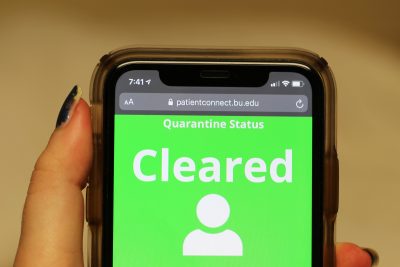
By: Zach Murray and Melissa Ellin
Boston University’s COVID-19 testing and attestation enforcement policy allows faculty to request all students show a green-colored badge indicating compliance with safety requirements before entering class. Some professors teaching in-person classes have been relying on the honor system instead.
Professors retain the right to send away students who refuse to show their badge or who display a red badge, according to an Aug. 13 notice from Dean of Students Kenneth Elmore.
Failure to adhere to professors’ rules may result in contact with the non-compliant student’s respective dean, who will decide disciplinary measures from there.
Elmore wrote in his notice that the University is putting faith in students to do their part.
The University has implemented a range of policies to limit the spread of coronavirus, including daily symptom surveys, regular testing of all students and rules mandating face coverings.
But professors are not required to request proof of compliance before class.
BU spokesperson Colin Riley said the administration is putting the “best practices” in place to keep students and faculty safe.
“It’s discretionary for faculty,” Riley said. “Essentially, it’s an option for faculty.”
Riley said he was not present in discussions that determined why proof of compliance is not a requirement for students attending in-person classes, but that the distanced learning measures implemented in classrooms this Fall seem to be effective so far in preventing community-wide spread.
Since the COVID-19 testing pilot program began on July 27, BU’s positivity rate is at a cumulative 0.09 percent, according to the University’s COVID-19 Testing Data Dashboard.
Christopher Schmitt, an assistant professor in the College of Arts and Sciences, wrote in an email he chooses to mandate that students present their compliance status before entering the classroom. He added that he would not hesitate to send non-compliant students away, given they can re-enter remotely.
Schmitt has had a personal encounter with the virus, he wrote, which is partially why he is so vigilant.
“I contracted COVID-19 in July from a 22-year-old family member who had no symptoms, and appeared completely healthy,” Schmitt wrote. “I was not so lucky when I was infected, and am still, two months later, suffering from fatigue, having trouble breathing when exerting myself, and having difficulties concentrating.”
Schmitt also wrote that these measures are meant to protect everyone.
“I want to ensure that my in person classes are a space where the virus will not spread, either to my many students, or to myself when I’m vulnerable again to infection,” Schmitt wrote. “Part of that is ensuring that students who come into my teaching space are compliant with BU’s policies, including the daily attestations.”
College of Communication professor Mitchell Zuckoff wrote in an email that he does not require his students to show their badges. However, he wrote he is strict about University-mandated guidelines.
“We’ve been vigilant about wearing masks, and have remained socially distant in compliance with Covid-adjusted classroom density, in well-ventilated rooms,” Zuckoff wrote. “In light of BU’s low positivity rate, I’ve felt as safe teaching as I do shopping at Whole Foods. Probably safer.”
John Terhune, a teaching facilitator in COM, said he thinks professors who don’t feel comfortable asking students to show their attestation badges should not be forced to do so.
He said he believes a policy to give professors lists of students who have completed their compliance requirements would be beneficial.
“I know that things can get complicated with health privacy concerns for the legal aspects there,” Terhune said. “But if there were no legal hurdles, I’d be happy with that system.”
Terhune, a graduate student, said that from a student’s perspective, he feels that BU is adhering to its COVID-19 guidelines.
“It seems to me like everybody is doing their best, both my classmates and professors included,” Terhune said. “I’ve had a positive experience.”
Caden Mayfield, a freshman in the Questrom School of Business, has two in-person classes. He said he has not been asked to show his badge in either class, but that such a measure could be useful.
“[Checking badges could] help keep kids in check,” Mayfield said, “to make sure they’re always doing the surveys and to increase the level of comfort for a lot of people who attend in person.”
CAS freshman Nora Slovak said she is satisfied with BU’s efforts in keeping the community safe, but that it’s also easy for students to lie about compliance.
“I think they’re taking really good measures to keep everyone safe,” Slovak said. “I don’t know how much I trust college students on being accurate in reporting their symptoms.”
























































































































Ted Michaels • Sep 20, 2020 at 8:42 pm
Why in the HELL isn’t BU enforcing this at every class? If they can’t manage it even for allowing people into buildings – SHIT IT ALL DOWN AND GO ALL REMOTE like many other schools, What kind of tuition discount and credit am I going to get if my kid gets COVID and he has a bad cause and it messss up his academic schedule? Am I going to get free summer classes or extra semesters or is BU going to cornhoke everyone with another yearly tuition hike?